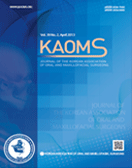Journal of the Korean Association of Oral and Maxillofacial Surgeons
- P-ISSN2234-7550
- E-ISSN2234-5930
- SCOPUS, KCI, ESCI
 ISSN : 2234-7550
ISSN : 2234-7550
Evaluation of postoperative complications according to treatment of third molars in mandibular angle fracture
Abstract
Objectives: The aim of this study was to evaluate the implication of third molars in postoperative complications of mandibular angle fracture with open reduction and internal fixation (ORIF).Materials and Methods: Data were collected on patients who presented with mandibular angle fracture at our Department of Oral and Maxillofacial Surgery between January 2011 and December 2015. Of the 63 total patients who underwent ORIF and perioperative intermaxillary fixation (IMF) with an arch bar, 49 patients were identified as having third molars in the fracture line and were followed up with until plate removal. The complications of postoperative infection, postoperative nerve injury, bone healing, and changes in occlusion and temporomandibular joint were evaluated and analyzed using statistical methods.Results: In total, 49 patients had third molars in the fracture line and underwent ORIF surgery and perioperative IMF with an arch bar. The third molar in the fracture line was retained during ORIF in 39 patients. Several patients complained of nerve injury, temporomandibular disorder (TMD), change of occlusion, and postoperative infection around the retained third molar. The third molars were removed during ORIF surgery in 10 patients. Some of these patients complained of nerve injury, but no other complications, such as TMD, change in occlusion, or postoperative infection, were observed. There was no delayed union or nonunion in either of the groups. No statistically significant difference was found between the non-extraction group and the retained teeth group regarding complications after ORIF.Conclusion: If the third molar is partially impacted or completely nonfunctional, likely to be involved in pathologic conditions later in life, or possible to remove with the plate simultaneously, extraction of the third molar in the fracture line should be considered during ORIF surgery of the mandible angle fracture.
- keywords
- Mandibular fracture, Third molar, Open reduction
- Downloaded
- Viewed
- 0KCI Citations
- 0WOS Citations